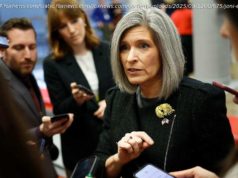President Trump is talking about pulling American troops out of Syria, but his own White House is contradicting him.
Depending on which newspaper you read, and what you believe, the White House is sending some decidedly mixed signals when it comes to our policy in Syria.
This morning, The Washington Post reported that President Trump is instructing the military to prepare for a withdrawal of American military forces from Syria:
President Trump has instructed military leaders to prepare to withdraw U. S. troops from Syria but has not set a date for them to do so, according to a senior administration official.
In a meeting with top national security officials Tuesday, Trump stressed that U. S. troops can be involved in current training tasks for local forces to ensure security in areas liberated from the Islamic State, the official said.
But the president said that the U. S. mission would not extend beyond the destruction of the Islamic State, and that he expects other countries, particularly wealthy Arab states in the region, to pick up the task of paying for ongoing stabilization and reconstruction, including sending their own troops, if necessary.
In a statement Wednesday morning, the White House said that the “military mission . in Syria is coming to a rapid end, with ISIS being almost completely destroyed. The United States and our partners remain committed to eliminating the small ISIS presence in Syria that our forces have not already eradicated.”
The statement said, “We will continue to consult with our allies and friends regarding future plans. We expect countries in the region and beyond, plus the United Nations, to work toward peace and ensure that ISIS never re-emerges.” ISIS is an acronym for the Islamic State.
The decision, which Trump had telegraphed with recent statements saying it was time for the United States to “get out” of Syria, appeared to conflict with senior military officials who have repeatedly outlined the need for an ongoing military presence in Syria.
Those officials have stressed the importance of preventing both an Islamic State resurgence and increased territorial gains by Russian and Iranian-backed Syrian forces, and of giving the United States leverage in upcoming political talks to resolve Syria’s civil war.
The New York Times, meanwhile, reports that “White House Says U. S. Will Remain in Syria Despite Trump’s Eagerness to Withdraw”:
WASHINGTON — The White House said on Wednesday that the United States is committed to continuing to fight the Islamic State in Syria, signaling a retreat by President Trump from his insistence that the 2,000 American forces there quickly return home from the conflict.
“The military mission to eradicate ISIS in Syria is coming to a rapid end, with ISIS being almost completely destroyed,” Sarah Huckabee Sanders, the press secretary, said in a statement issued one day after Mr. Trump met with military commanders to discuss the future of the mission. “The United States and our partners remain committed to eliminating the small ISIS presence in Syria that our forces have not already eradicated.”
The statement indicated that the president’s top military advisers, who have argued that maintaining United States forces in Syria is crucial to defeating the Islamic State and ensuring that the militant group cannot regain a foothold in the region, have succeeded — at least for now — in persuading an impatient commander in chief not to order a quick withdrawal.
It was the latest instance of the president making an unscripted remark with far-reaching implications that prompted a behind-the-scenes scramble by his advisers to translate blunt talk into an official government policy. White House and administration officials also had spent Monday and Tuesday trying to translate a series of confusing presidential tweets and comments on immigration into a coherent strategy, including a new legislative push and the mobilization of the National Guard to the southern border.
The statement on Syria was issued one day after Mr. Trump made plain his eagerness to pull American troops out, arguing that the United States had essentially already won the battle against the Islamic State and saying that “sometimes it’s time to come back home.”
“I want to get out — I want to bring our troops back home,” Mr. Trump said on Tuesday during a news conference with leaders of Baltic nations. “It’s time. We were very successful against ISIS.”
The United States has been aiding a military campaign in Syria that has reclaimed much of the territory once under the control of the militant group. But while Mr. Trump has expressed enthusiasm for battling ISIS, he is reverting to the “America First” posture he pressed as a candidate, hoping to separate the United States from foreign involvement and military adventures abroad.
The decision comes as Mr. Trump’s national security team is in flux, and has been divided over what to do in Syria. The president ousted his secretary of state, Rex W. Tillerson, last month, and his national security adviser, Lt. Gen. H. R. McMaster, is soon to depart after Mr. Trump decided to replace him with John R. Bolton.
While Mr. Trump has pressed intensively to withdraw troops and unwind American involvement, Pentagon officials argued strenuously in recent days against a pullout of all United States troops from Syria. They pointed to the rise of the Islamic State in Iraq after former President Barack Obama withdrew troops from there as a precedent they said laid the groundwork for the militant organization to flourish there.
Defense Department officials say that sacrifices made by the American military in Syria could be washed away if troops leave precipitously.
“A lot of very good military progress was made over the last couple years,” said Gen. Joseph L. Votel, the top officer at the military’s Central Command, during a conference in Washington on Tuesday.
“But again, the hard part I think is in front of us, and that is stabilizing these areas, consolidating our gains, getting people back into their homes, addressing the long-term issues of reconstruction and other things that will have to be done,” General Votel said.
Col. Ryan Dillon, the spokesman for the American-led coalition in Iraq and Syria, said that the Islamic State still holds territory in the mid-Euphrates River Valley, and noted that trying to rout the remaining militants has proved difficult as offensive operations have all but ceased in the area.
The Guardian, meanwhile, seems to indicate that Trump has apparently acceded to the advice of his military advisers:
According to a senior administration official, Trump agreed at a US National Security Council meeting late on Tuesday to keep US troops in Syria a little longer, and did not approve a specific withdrawal timetable. “We’re not going to immediately withdraw but neither is the president willing to back a long-term commitment,” the official said.
Trump’s replacements for Tillerson and McMaster, Mike Pompeo as secretary of state and John Bolton as national security adviser, both advocate finishing off Isis but are even more hawkish on deterring Iran.
Senior officials say they will use the argument that a US pullout from Syria would leave the region open to further Iranian advances.
As Daniel Larison notes, the statement that American troops are going to stay in place for “a little longer,” can basically be taken as confirmation of the fact that we won’t be leaving for the foreseeable future and that American troops will remain in the country for many more years to come. The inevitability of this outcome started to become apparent earlier this year when then-Secretary of State Rex Tillerson said that the United States would maintain a military presence in the countr y even after ISIS is defeated in order to continue aiding the rebels seeking to overthrow the government of Bashar Assad, who they have been fighting in a civil war that has lasted for seven years now.






